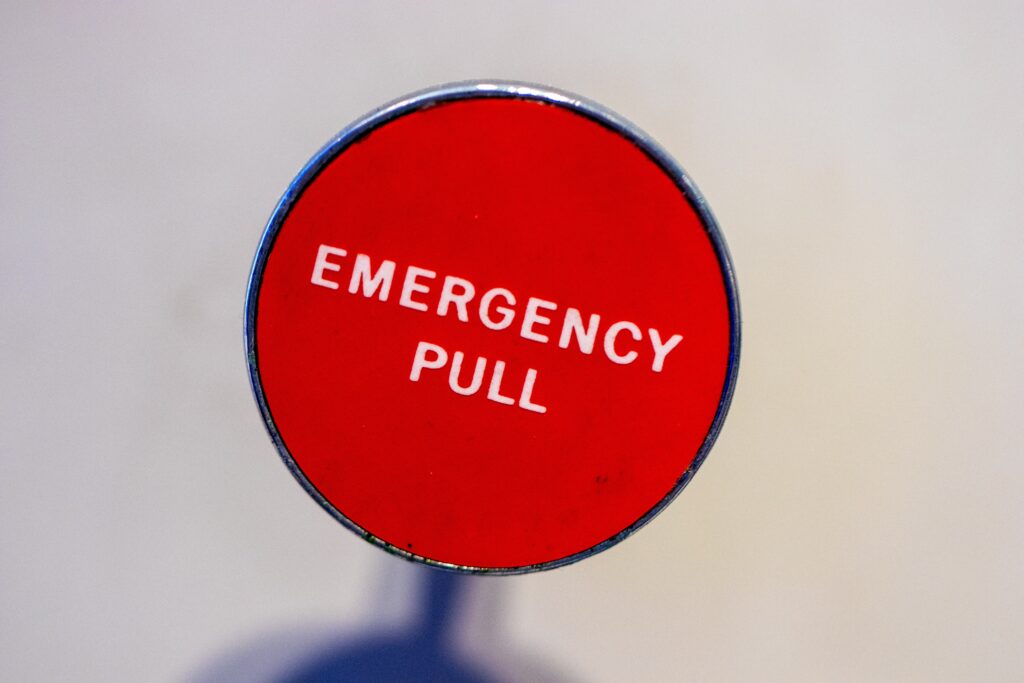Crisis Communications Training with Brightfires Media

Crisis communications training could be the best investment you make for your organisation. Do you know what to do when your company’s reputation is at stake due to a crisis situation? The truth is, as soon as a problem arises, the public will know. The best way to prepare for this eventuality is by having a well-thought-out and regularly tested crisis communications plan in place.
Many types of crises can arise in any business, so it’s essential to be prepared. You need to be aware of crisis communication planning and train your team to be able to tackle any situation.
It is easy to say nothing and very tempting to react quickly and defensively – before you are ready. The key is not to go with the natural reaction of panic. You need clear thinking, all the facts, and the confidence to control the agenda.
First, let’s understand what crisis communication is and how it supports organisations or businesses through the worst situation when a crisis occurs.

What is Crisis Communications?
Crisis communication refers to understanding the risks from your company’s activities and media relations and preparing for a crisis. Rehearsing how you will react when unexpected events occur, helps prevent an issue from getting out of control and from escalating further than necessary.
This type of communication involves having plans in place before emergencies happen. The relevant team members should know how to prevent panic, set the appropriate tone of response, and align the internal and external messages for update purposes.
How To Learn Crisis Communication Skills?
Crisis Communication skills are crucial in conveying emergency updates to the public. The purpose of such skills is to ensure that information is communicated efficiently and effectively. It is possible to learn these skills by taking a crisis communications course online or in-person with Brightfires Media.
A person must think clearly and quickly when assessing a situation and deal with it on the spot. Quick judgments need to be made while saving the brand’s reputation and looking ahead at the longer term plan. So, be sure to get crisis communication training for corrective actions.
Importance Of Crisis Communication Training
A crisis can happen at any moment. Whether it be a natural disaster, human error or an accident, many different types of situations could impact your company. It is essential to take the time and invest in a crisis communication training program for all employees because having a plan in place will help you mitigate the effect of the crisis and reduce the amount of damage done to your brand image.
Crisis communications can be a scary prospect, but it’s essential to know how to handle them. Training in crisis communication is vital for any organisation that wants to protect its reputation and stakeholders.

1. Communications During Crisis
A person or team must be able to communicate effectively among each other and those outside the organisation. Crisis communications training teaches you how to behave when the worst has happened. This is critical to ensuring your crisis is minimised both practically and publicly.
Communicating correctly could even be an opportunity to show what a responsible company you are when unexpected issues occur.
Training helps you learn how to implement policies, procedures, and protocols during an emergency. Crisis communications courses deal with how to monitor and respond to what is said, including developing holding statements and preparing answers to tough media questions.
2. Planning Abilities
Crisis communications training teaches people how to handle serious problems, protect the company’s reputation, and help them plan for future communications. These courses are designed to teach people how to manage the organisation’s image by recognising possible problems and reacting accordingly.
The media is often quick to jump on any controversy. You need to respond to journalists as well as protect your reputation. Being proactive will prevent problems that could happen if no action is taken.
3. Prevent The Spread Of Misinformation
Having a plan in place allows organisations to prevent the spread of misinformation. When people are not ready for crisis risks, they can take too long to react appropriately. This leaves the public to be suspicious of the corporation and more inclined to believe information available on social media or television because it seems helpful and easy to access.
If you are prepared, the public will get fair and accurate updates from your organisation instead of rumours from third parties. It is very important not to disappear from public view and create an ‘information vacuum.’ You want to ensure speculation doesn’t spiral and increase the damage.
4. Emergency Crisis Preparedness and Response
Crisis management training helps people learn the proper procedures for dealing with all sorts of emergencies. From minor problematic events to more severe PR disasters, proper response techniques must be used to mitigate reputational damage.
This training will focus on getting your message across under pressure, and techniques for handling reporters who are looking for a bad news story. You will deal with awkward questions more calmly once you understand what the media are looking for, and the angles they will try and use. The training will enable you to turn the story around to showcase the important, positive action you are taking and wish to publicise.

How Crisis Communications Training And Skills Help An Individual Or Company
Enhanced crisis communications play a big part in the handling of information related to the crisis. A good communicator with appropriate training and relevant skills makes the communication effective with stakeholders. A skilled spokesperson can tackle the media while addressing a variety of crisis-related problems.
A well-developed strategy of crisis communications can positively impact many factors, such as the growth of trust and credibility of an organisation.
Crisis communications training contains theoretical communications practices and principles, plus practical experience that will reinforce learnings and ensure attendees are ready to take on the media.
1. Build Trust
Gaining and maintaining trust is quite critical while developing crisis messages. Consistency plays a crucial role in trust-building. The use of different platforms creates multiple challenges of message consistency. During message development, make sure to be consistent at crisis time.
Consistent crisis communications enhances coordination and increases dissemination in emergency times. Trust building becomes easy when you use simple language and solutions.
2. Build Reputation
How a crisis is dealt with can easily destroy a reputation, but if done properly, it can actually improve your reputation. The unfortunate situation can display that you are able to hold up to scrutiny when tested. It can show how much you care for your customers, clients and staff. It can reveal your integrity and honesty and willingness to improve or turn things around.
The propagation of information along regular updates casts a positive image during situations. The dissemination of information makes stakeholders aware of happenings and reassured that it is being confidently handled. It helps to create a better corporate image.
Social media is at the forefront of spreading information in a crisis and getting ahead of the negative message on these platforms is crucial. It is certainly worth focussing on socials in the early stages of a crisis to prevent the wrong message going viral.
When a problem arises, it becomes critical for organisations to consider all relevant aspects of media. A game plan could be needed for each of the genres. Therefore, crisis management plans and strategies need to be aware of the requirements of each of the platforms and the different broadcasters they may have to deal with.

3. Enhanced Productivity
Just like trust and image, productivity improvement becomes critical during crises. It brings forward a sense of belonging and strengthens working relationships. Also, it boosts the working environment and empowers the employees in the decision-making process.
Increased productivity among members proves to be vital in maintaining integrity and building good work relations among people. Crisis management effort plays its role in it.
4. Opt The Change
During crisis events, revolutionized technology creates much difference in tackling challenges. Avoiding communication regrets is vital as this can cause long-lasting effects on organizations. Deploying the correct crisis communication strategies makes you avoid such regrets. It requires proper planning and training.
Implementation of detailed crisis communication strategy by crisis management team through multiple platforms such as texting streaming etc., enables the organizations to prepare and propagate reliable information. This implementation leads to fewer regrets.
5. Quick Solutions
Platforms such as Facebook, Twitter and other social media sites can play a significant role in maintaining the reputation and management of effective communication. Social media incorporation contributes to effective crisis management.
Dissemination of information promptly assists in pre-crisis stage and post-crisis communication situations as well.
6. Career Progression
Crisis response requires enhanced and strategic communication skills to cater to advanced needs and potential crises in today’s progressive world. Only developed communication skills can help you in managing situations and keeping up to stakeholders expectations. Practical training enables the team members to adapt to the course of action and allows good rapport.
Crisis Communication Training with Brightfires Media
Brightfires media is a known media training group run by senior professional journalists. Our communication consultancy offers all kinds of media and communication training courses.
We offer these courses both in physical and online mode. Spontaneous statement delivery, handling impulsive interviews, dealing with media requests, we will show you how to deal with all like a pro.
Our courses are based on theory and practicals, which will make you learn to deal with actual situations. Everything learned is worthy of use in real scenarios and test interviews.
Our coaching caters to all levels of employees with customized training packages.
We collaborate with PR departments and provide training aligned with the goals of the company. Our core strengths are crisis communications training, presentations skills, and training executives.
Choose training for yourself or your management or communication team! We will bring confidence in you to remain authoritative and compassionate as the challenge descends. Our media training courses will prepare you in the best manner for your business continuity.

FAQs
What Happens During Crisis Communications Training?
During training, we will walk you through various types of emergencies that companies specifically handle. All responses should be quick and concise, so there is minimal harm done. Once someone has been trained on how to handle the situation safely, they would know what steps to take without panicking and making things worse than they already are. You’ll be able to mitigate your reputational risks, create contingency comments and response plans.
What Role Does Group Crisis Communications Play?
It is a well-known fact that during times of emergency, misinformation can be spread like wildfire. But the group communication plan will help to communicate swiftly, manage hostile media, and implement your action plan. When executed correctly, this practical approach offers clarity and direction for key stakeholders as it inspires confidence.
How Can Individuals Benefit From Crisis Communications Training?
Individuals benefit by knowing how to handle themselves during any crisis, whether at their workplace or somewhere else that requires quick thinking and responses. Companies should continually train their employees to communicate quickly and appropriately in crises, no matter what kind of job someone has. It’ll ensure that everyone knows exactly what steps need to be taken in case of an emergency to communicate instantly and build a brand image.
